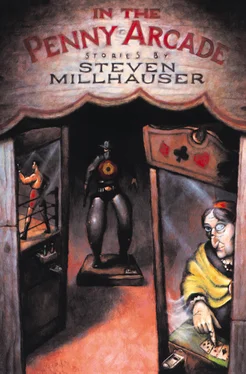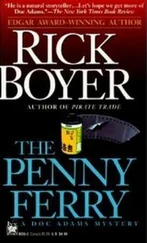One morning about two years after his return to Mühlenberg, a stranger walked into the shop. He was a handsome, slender young man of about August’s age, dressed in a beautifully tailored dark-blue suit which he wore with a careless ease and which, August noticed with amusement, precisely matched the color of his eyes. He held under one arm an elegant walking stick with a top shaped like the head of a grimacing troll — it was really a clever piece of work, and August for some reason imagined it coming to life and biting a finger — and he carried in one hand a parcel wrapped in brown paper. He asked in a Berlin accent if he might speak to August Eschenburg. August was alone in the shop that morning and at once presented himself to the elegant stranger, who proceeded to study him with a cool, amused frankness that might have been insolent had it not seemed so good-natured. A dim memory stirred, but August could not quite place him. “I’ve a package for you,” the stranger then said, and handed him the parcel, adding the single word: “Hausenstein.” August, amused and not at all irritated by the deliberate air of mystery, opened the package. It contained his miniature boy writer. He looked up in surprise, and recognized the blond-haired youth whom he had fleetingly seen in the window with Preisendanz.
“I thought you might want it as a keepsake. A pleasant little souvenir of the dear old days. Ah, the days of our fled youth — pity they didn’t flee a little quicker. It’s quite clever, Eschenburg — brilliant, as a matter of fact. They’re forgotten now — the fools are more fickle than even I supposed. You’re still at it, I trust?” He glanced around keenly. “Incidentally, I’m the fellow whose trash drove you out. Do you have a few minutes? Odd question to put in a clockshop.”
Preisendanz had hired him out from under the noses of the Grimm brothers, who within a year had sold their premises to an insurance agency and returned to Hamburg. Hausenstein — he never gave his first name, and August never asked — had been paid a small fortune to supply his new master with an uninterrupted stream of automatons cleverly combining the genteel and the lascivious, and although for a time he had found the work stimulating, it had soon begun to pall. He could not look forward with excessive ardor to spending the rest of his life in the production of rubbish for the likes of Preisendanz and the beloved German populus . Oh, he knew it was rubbish, and he was superb at his job precisely because he knew exactly what was required — and now that he had a bit of money he wanted to strike out on his own. He had recognized at once the astonishing quality of the Eschenburg automatons, for he himself possessed a small talent in that line, and he had recognized at the same time that those automatons were fated to be driven out by the sort of cheap approximation that was the true symbol of the new age. Since this fate was inevitable, he had decided to be its instrument. It amused him to calculate to the finest hair’s-breadth the precise level of vulgarity to which one must sink in order to gain the hearts of the modern masses — the German masses in particular. But really the entire century was rushing toward a mediocrity that a youthful cynic could only find delightful, justifying as it did his low opinion of mankind in its present form. Nietzsche, bless his romantic soul, had invented the Übermensch, but Hausenstein had countered with a far better word: the Untermensch. By Untermensch he certainly did not wish to suggest the rabble — they were far too poor and hungry to concern themselves with anything at all except scraping out a miserable living in a wretched world. No, the Untermensch was a strictly spiritual term, and by it he meant the kind of soul that, in the presence of anything great, or noble, or beautiful, or original, instinctively longed to pull it down and reduce it to a common level. The Untermensch did this always in the name of some resounding principle: patriotism, for example, or the spirit of mankind, or social progress, or morality, or truth. The Untermensch had always existed in the world, but until the second half of the nineteenth century he had remained a relatively modest force, only occasionally rising up to tear down something he could not understand — a statue, say, or a book, or a liberator. But in the present half-century the spirit of the Untermensch had spread until it had taken over the Western world — it ruled in America, in France, in Britain, and above all in that newest nation, that quintessentially modern nation which had patched itself together in the latter days of history, Germany herself, the immortal Vaterland. In Germany the spirit was far more pervasive than elsewhere, and far more dangerous, for there the mediocre and modern joined hands with darker and more ancient forces; the union was perfectly expressed in the Prussian army, which combined the modern idea of efficiency with ancient bloodlust. But he was digressing; he meant only to suggest that he was a student of the modern age, and as a student he had seen clearly that the automatons of Eschenburg must give way before the automatons of Hausenstein, that cheerful apostle of the Untermensch.
Well, it had been amusing for a time, and he had made quite a pile; but even he had to confess that a prolonged submersion in the rank swamplands of the modern mass soul was not the most pleasant way in which to spend one’s bit of time on the merry way to extinction. Besides, it was clear that even the most tedious cynic such as himself could not be a cynic except in relation to an ideal, and it therefore followed that even he, and perhaps he especially, had a sense of what was being dragged down. His dabbling in the clockwork line had enabled him to recognize that August’s figures were brilliant, and entirely out of place in the windows of the Preisendanz Emporium. He, Hausenstein, confessed to a weakness for brilliance, on the rare occasions when he came across the real thing; and his wealth now permitted him to indulge a whim. In short, he was proposing to finance August Eschenburg in the little matter of an automaton theater. He had the place selected already, in Berlin; he himself would manage the theater but would exercise no control whatever over August. He did not pretend to be disinterested: he had reason to believe that he would rake in a nice profit, and in addition he was curious to see the direction Eschenburg’s talent would take, once left to its own devices.
August listened to all this with amusement, with interest, and with growing irritation. He felt irritated because he felt tempted; somehow or other, this debonair and embittered visitor had given voice to one of his deepest longings. Even during the Preisendanz years, when from the sidewalk he had watched his early automatons going through their motions, the idea of a theater had scattered its seeds across his mind; and since his return to Mühlenberg, the idea had taken secret root and begun to grow. And now, at the touch of Hausenstein’s words, it had burst into dangerous flower. August could not make sense of Hausenstein: he distrusted him, and yet there was a disarming frankness about him that left August puzzled and uneasy. Why had he come? Hausenstein was obviously bored, bored deep in his spirit, in the manner of someone whose intelligence is far greater than his talent; but ennui had distractions far more amusing than the automatons of a watchmaker in Mühlenberg. Was he — this mocker of men and self-declared apostle of the Untermensch — was he perhaps secretly afraid that he too was one of the mediocre? Did he need to bathe himself in the fluid of another’s creativity, in the hope that he would be washed clean of all that was common in him?
August, uncertain, asked Hausenstein to return in the evening and visit him in his workshop. That evening he showed Hausenstein the figures he had created in the last two years, and only when the demonstration was over did he realize that he had been testing Hausenstein: one false note of praise, one inaccuracy of judgment or coarseness of perception, and August would have sent him off with his tedious boredom and his mocking mouth. But Hausenstein, no less than Preisendanz before him, knew what he was talking about. Without becoming falsely earnest, without altering his manner of worldliness, amusement, and contempt, Hausenstein spoke with authority and precision about what he called the Eschenburg automatons. He said he liked women with more blood in them, and told August to visit brothels for the sake of his art; he pointed out a very minor flaw in one figure that only an expert could possibly have detected. His praise was also precise; and he compared the Eschenburg figures in detail with the greatest automatons of the last hundred and fifty years. Technically, August had carried the art beyond any point it had reached before; and it was clear that he would never rest until he had created a figure capable of all the motions of the human musculature. In this striving, there was madness; but no doubt it was as good a way as another to pass the time.
Читать дальше












